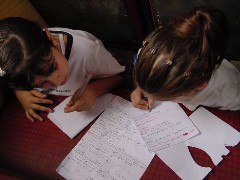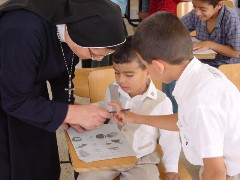|
3:00 AM, Rooster (3 sec.) 3:00 AM, Dogs (5 sec.) 4:45 AM, Muslim prayer (40 sec.) 6:00 AM, Church bells (40 sec.) 7:30 AM, National Anthem (40 sec.) |
|
Wednesday, 10/1/03: Suddenly traveling seems like a thoroughly pleasant experience rather than an endless series of waiting at checkpoints and the whims of various soldiers. We arrived in Cairo after a long but relatively painless crossing out of Israel, though the same couldn't be said for our colleagues who work in Jordan - they got bumped from their flight and will try again tomorrow. We meet up with the rest of the PCUSA contingent at Ramses Girls' College. This is one of many institutions run by the Coptic Evangelical (Presbyterian) Church here in Egypt. It was good to reunite with friends and colleagues, including those whom we have come to know in Iraq and Lebanon, in Cyprus, and during orientation in Louisville. After some pizza and ping-pong, it was off to Beit as-Salam Presbyterian Retreat Center in Agamy, not far from Alexandria. Along the way we made a stop to refresh at a roadside mall/oasis where the lowlight was the lion cub on a leash with which you could get your picture taken (we abstained). The evening's highlight was dinner at the Africana Hotel, hosted by members of the local Alexandria Presbyterian church. Upon arrival at the restaurant, the power went out, which in an odd way helped us feel at home. The Retreat Center in Agamy is dramatically beautiful. We will be here for three days recharging our batteries and getting caught up on what is happening in the rest of the PCUSA world as we know it in the Middle East.
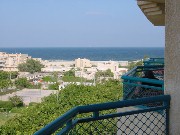 _____
_____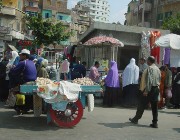 _____
_____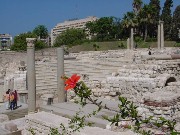
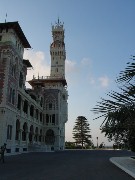
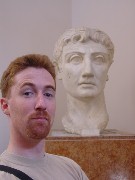 theater
found in Egypt. After marveling at that site, we moved on to the
Alexandria Museum, with treasures of the city's
theater
found in Egypt. After marveling at that site, we moved on to the
Alexandria Museum, with treasures of the city's 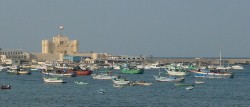 Greco-Roman
period. Unfortunately for us, the museum is undergoing major renovations,
and only a tiny fraction of its 40,000 artifacts were on display.
Nonetheless, it was well worth the visit, with fantastic sculptures, textiles,
and frescoes. A guide pointed out to us that the meeting of cultures in
Egypt also resulted in a fusion of artistic styles, blending traditional
Egyptian, Greek, and Roman elements and motifs. From there
it was a visit to nearby catacombs. Alexandria is a waterfront city,
which means that underground burial was odd business. Water levels
beneath the ground rose high enough to do their damage through the centuries,
and the high humidity left remains which disintegrated into dust when simply
touched by those excavating the site. We met up with leaders from
the Alexandria church again for a seafood lunch along the water. The Senior
Pastor, Rev. Dr. Gendi Rizk, is on the board, as is Marthame, of Evangelicals
for Middle East Understanding - so are two other of the PCUSA's Middle
East mission staff, so we joked about having a board meeting since we had
a quorum. Our final stop was at King Farouk's Palace, a relic from
the days of Egypt's monarchical days. It is currently used as a Presidential
guesthouse - democracy, monarchy, there's always room for the privileged.
Our co-workers in Jordan tried to come again today, but because the kids
are in Jordan with Palestinian IDs (he's from the States, she's from Bethlehem),
they were not allowed to fly on their American passports. Tomorrow
we all hope they'll be able to join us.
Greco-Roman
period. Unfortunately for us, the museum is undergoing major renovations,
and only a tiny fraction of its 40,000 artifacts were on display.
Nonetheless, it was well worth the visit, with fantastic sculptures, textiles,
and frescoes. A guide pointed out to us that the meeting of cultures in
Egypt also resulted in a fusion of artistic styles, blending traditional
Egyptian, Greek, and Roman elements and motifs. From there
it was a visit to nearby catacombs. Alexandria is a waterfront city,
which means that underground burial was odd business. Water levels
beneath the ground rose high enough to do their damage through the centuries,
and the high humidity left remains which disintegrated into dust when simply
touched by those excavating the site. We met up with leaders from
the Alexandria church again for a seafood lunch along the water. The Senior
Pastor, Rev. Dr. Gendi Rizk, is on the board, as is Marthame, of Evangelicals
for Middle East Understanding - so are two other of the PCUSA's Middle
East mission staff, so we joked about having a board meeting since we had
a quorum. Our final stop was at King Farouk's Palace, a relic from
the days of Egypt's monarchical days. It is currently used as a Presidential
guesthouse - democracy, monarchy, there's always room for the privileged.
Our co-workers in Jordan tried to come again today, but because the kids
are in Jordan with Palestinian IDs (he's from the States, she's from Bethlehem),
they were not allowed to fly on their American passports. Tomorrow
we all hope they'll be able to join us.Friday, 10/3/03: We spent today hearing reports from our fellow workers throughout the region. The bulk of them are in Egypt, working with local partner organizations as teachers, professors, social workers, nurses, administrators - it's a wonderful variety of ministry. Another is based in Lebanon with the Middle East Council of Churches. He shared news from
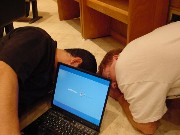 Iraq.
Until now, he says, the situation for Christians has not changed, which
means they still enjoy status as a well-respected minority. However,
the fear is that all of the upheaval (as well as the uncertain future)
has given license to radical Islamic groups who will change that.
He also shared the variety of opinion within the Iraqi population - one
Iraqi Presbyterian roundly criticized the "chaos" America has brought to
his country, while a Sunni Muslim told him, "Anything is better than Saddam."
Our Jordanian staff (finally able to come and join us) shared their trials
of the last two years, which included a brief time in Bethlehem when they
first arrived. After the family was caught under the siege of the
Nativity Church and tear gassed in their homes by the Israeli army, they
decided enough was enough and relocated to Jordan. From there, he
travels to Egypt and the Occupied Territories to work on issues of hunger,
something that is newly devastating for the Palestinian population. We
shared the situation and our work along with our colleague in Jerusalem,
getting an opportunity in the evening to show the first segment of our
film project. It was well-received, and we were relieved to see the
technology cooperating (with some coercion) from laptop to LCD projector.
Evenings, we often retire to the cantina outside where we relax in the
sea breeze and sip freshly-squeezed mango juice. There are several
local conferences going on, and the Center is teeming with Egyptian Presbyterian
life!
Iraq.
Until now, he says, the situation for Christians has not changed, which
means they still enjoy status as a well-respected minority. However,
the fear is that all of the upheaval (as well as the uncertain future)
has given license to radical Islamic groups who will change that.
He also shared the variety of opinion within the Iraqi population - one
Iraqi Presbyterian roundly criticized the "chaos" America has brought to
his country, while a Sunni Muslim told him, "Anything is better than Saddam."
Our Jordanian staff (finally able to come and join us) shared their trials
of the last two years, which included a brief time in Bethlehem when they
first arrived. After the family was caught under the siege of the
Nativity Church and tear gassed in their homes by the Israeli army, they
decided enough was enough and relocated to Jordan. From there, he
travels to Egypt and the Occupied Territories to work on issues of hunger,
something that is newly devastating for the Palestinian population. We
shared the situation and our work along with our colleague in Jerusalem,
getting an opportunity in the evening to show the first segment of our
film project. It was well-received, and we were relieved to see the
technology cooperating (with some coercion) from laptop to LCD projector.
Evenings, we often retire to the cantina outside where we relax in the
sea breeze and sip freshly-squeezed mango juice. There are several
local conferences going on, and the Center is teeming with Egyptian Presbyterian
life!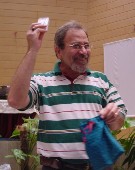 Saturday,
10/4/03: We spent much of today getting caught up on what has
been happening with the PCUSA offices in Louisville, Kentucky, including
working on interfaith dialogue projects in the US. As it was our
last full day here, we made the most of it, playing soccer on the (grass!)
field, swimming in the pool, and playing a swapping game. Everyone
contributed an item to give away (no one knew this would happen, so the
assortment of gifts was quite odd), and then traded and traded until they
were all distributed. They ranged from a lovely wooden cross to a
half-eaten bag of Doritos. Since today was Elizabeth's birthday,
it seemed fitting that she ended up with one of the more useful and prized
gifts, a book. Marthame got a seashell. And Charlie Brown got
a rock. Poor, poor Charlie Brown.
Saturday,
10/4/03: We spent much of today getting caught up on what has
been happening with the PCUSA offices in Louisville, Kentucky, including
working on interfaith dialogue projects in the US. As it was our
last full day here, we made the most of it, playing soccer on the (grass!)
field, swimming in the pool, and playing a swapping game. Everyone
contributed an item to give away (no one knew this would happen, so the
assortment of gifts was quite odd), and then traded and traded until they
were all distributed. They ranged from a lovely wooden cross to a
half-eaten bag of Doritos. Since today was Elizabeth's birthday,
it seemed fitting that she ended up with one of the more useful and prized
gifts, a book. Marthame got a seashell. And Charlie Brown got
a rock. Poor, poor Charlie Brown.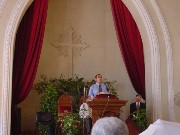
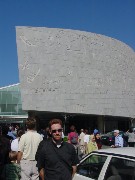 Sunday,
10/5/03: We made our way to the Saray Presbyterian Church in
Alexandria to share in worship with Pastor Rizk and the rest of the community
there. It is a joy to get to share in Presbyterian worship again.
The sermon was in both English and Arabic for everyone's benefit.
Following worship and a reception at the church, it was off to a quick
visit at the nearby Presbyterian school for disabled children. Its
ministry has been a blessing to that community, which faces a lot of prejudice
and misunderstanding in Egypt. The parents of the children have been
particularly grateful for being able to show all how much they love their
kids. We then went to visit the new Library of Alexandria, which
opened only 3 years ago. Architecturally, it is quite interesting,
in the shape of a circle dipped towards the sea, partly submerged in a
pool of water which surrounds the library. The exterior is decorated
with calligraphy and inscriptions from the world's civilizations.
The project honors Alexandria's famous ancient library, the largest in
all antiquity with more than 500,000 volumes, which were lost to the world
in a series of disasters between 48 BC and 640 AD. We retired for
a walk along
Sunday,
10/5/03: We made our way to the Saray Presbyterian Church in
Alexandria to share in worship with Pastor Rizk and the rest of the community
there. It is a joy to get to share in Presbyterian worship again.
The sermon was in both English and Arabic for everyone's benefit.
Following worship and a reception at the church, it was off to a quick
visit at the nearby Presbyterian school for disabled children. Its
ministry has been a blessing to that community, which faces a lot of prejudice
and misunderstanding in Egypt. The parents of the children have been
particularly grateful for being able to show all how much they love their
kids. We then went to visit the new Library of Alexandria, which
opened only 3 years ago. Architecturally, it is quite interesting,
in the shape of a circle dipped towards the sea, partly submerged in a
pool of water which surrounds the library. The exterior is decorated
with calligraphy and inscriptions from the world's civilizations.
The project honors Alexandria's famous ancient library, the largest in
all antiquity with more than 500,000 volumes, which were lost to the world
in a series of disasters between 48 BC and 640 AD. We retired for
a walk along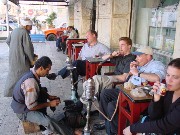 the Corniche, pausing to drink tea and "sip" on argile while
peddlers came by with wares from peanuts to rugs. Many of us bought
rugs, and many got their shoes shined before heading back to Agamy.
We stopped to get an English newspaper - a suicide bombing yesterday in
an Arab-owned Haifa restaurant killed nineteen. It has been a relief
to be sheltered from the onslaught of depressing and
the Corniche, pausing to drink tea and "sip" on argile while
peddlers came by with wares from peanuts to rugs. Many of us bought
rugs, and many got their shoes shined before heading back to Agamy.
We stopped to get an English newspaper - a suicide bombing yesterday in
an Arab-owned Haifa restaurant killed nineteen. It has been a relief
to be sheltered from the onslaught of depressing and 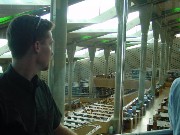 distressing
news for a few days, but of course that cannot go on forever. We
headed back to the Center feeling dark, frustrated, sad, and worried about
how this atrocity will push the region further into its pit of despair.
In the evening, we walked around the Retreat Center in order to get down
to the sea. We didn't go far in the water, but rather walked along
the beach, letting the surf nip at our feet and feeling the sand between
our toes. It's not something we get to do often in Zababdeh.
distressing
news for a few days, but of course that cannot go on forever. We
headed back to the Center feeling dark, frustrated, sad, and worried about
how this atrocity will push the region further into its pit of despair.
In the evening, we walked around the Retreat Center in order to get down
to the sea. We didn't go far in the water, but rather walked along
the beach, letting the surf nip at our feet and feeling the sand between
our toes. It's not something we get to do often in Zababdeh.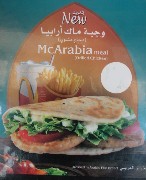
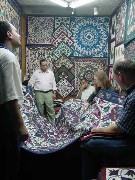
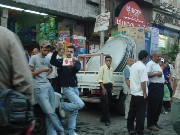 Monday,
10/6/03: This morning we set out on the road, headed back to
Cairo. Today is a national holiday in Egypt, remembering Egypt's
victory in the 1973 war. McDonald's was open, however, for a roadtrip
snack. We enjoyed our cokes and fries but decided to forego the "McArabia
Meal" - certainly the most distressing thing we've seen today. After a
couple hours on the road towards Cairo, passing green fields irrigated
by the Nile, we spent the afternoon and evening going around town.
Cairo is a world apart, buzzing and teeming with crowded, dusty, noisy
life. Our driver attempted to take our little van through the streets,
but soon it was clear we'd go faster walking - following Victor Makari,
the PCUSA's Middle East Director, who sets a mean pace back in his element.
We kept up pretty well, seeing the color and life of Cairo markets at sunset
- brass lanterns, fruit, spices, mosques and churches, the city is very
much alive. We spent a long time in the tentmakers' market, haggling
over quilted pillowcases and shirts. There is nothing quite like
Cairo at night. We hustled from the market to the Synod of the Nile offices
to meet with denominational representatives over tea and cookies. Then
we went to the popular Felfela Restaurant for a delicious evening meal.
The night was spent at a nice hotel, preparing for our one - perhaps two
- day journey back to Zababdeh.
Monday,
10/6/03: This morning we set out on the road, headed back to
Cairo. Today is a national holiday in Egypt, remembering Egypt's
victory in the 1973 war. McDonald's was open, however, for a roadtrip
snack. We enjoyed our cokes and fries but decided to forego the "McArabia
Meal" - certainly the most distressing thing we've seen today. After a
couple hours on the road towards Cairo, passing green fields irrigated
by the Nile, we spent the afternoon and evening going around town.
Cairo is a world apart, buzzing and teeming with crowded, dusty, noisy
life. Our driver attempted to take our little van through the streets,
but soon it was clear we'd go faster walking - following Victor Makari,
the PCUSA's Middle East Director, who sets a mean pace back in his element.
We kept up pretty well, seeing the color and life of Cairo markets at sunset
- brass lanterns, fruit, spices, mosques and churches, the city is very
much alive. We spent a long time in the tentmakers' market, haggling
over quilted pillowcases and shirts. There is nothing quite like
Cairo at night. We hustled from the market to the Synod of the Nile offices
to meet with denominational representatives over tea and cookies. Then
we went to the popular Felfela Restaurant for a delicious evening meal.
The night was spent at a nice hotel, preparing for our one - perhaps two
- day journey back to Zababdeh.Wednesday, 10/8/03: Two days it is. We tried to cross the bridge yesterday after our flight, but were informed it was closed because of Jewish holidays. No doubt the Israeli attack near Damascus will set things back throughout the region. We were initially told the bridge was closed until Friday, a time loss we couldn't suffer, but this turned out to be nothing more than rumor. We got up early this morning and hurried to the bridge only to wait two hours until the bus left for the Israeli side. Once there, the old system of two tracks - one Palestinian and one international - has been changed. Though internationals still get preferable treatment, the wait begins in line with Palestinians trying to cross back home. We were through the border checks in less than an hour, no doubt several hours faster than the sea of Palestinians waiting there. We caught a shared taxi back to Jerusalem, where we met up with our friend Andrea who is here to help us with filming. No sooner had we met up with her than we learned by chance that Fr. Aktham was in Jerusalem. Having only room for two, he took Elizabeth and Andrea in the car along with our luggage while Marthame determined to make his way and meet up with everyone back in Zababdeh. Checking with the Jenin-Ramallah drivers, things sounded iffy at best. No one was being allowed out of Jenin, but some folks were being allowed back in. Sharon's cabinet is meeting to decide what to do about the Haifa bombing, and Israeli Jews are in the midst of several religious feasts. Marthame caught the shared taxi from Jerusalem to Ramallah, but just outside of Beit Hanina, the traffic just stopped. Marthame assumed it was because of a checkpoint, and got out to walk - it's usually faster. He arrived at the front of the traffic jam to find hundreds of Palestinians trying to go both ways and about a dozen Israeli soldiers blocking their path. Past experience shows that internationals can often remain invisible in such situations, so Marthame tried to cross. "I'm going to my church. Here's my clergy visa." No way. He tried another soldier. Again, no way. He waited a few minutes, trying to figure out what other options there might be - Qalandia is the center for all West Bank access, and it seemed shut off. Marthame tried one more time, remembering the advice of an NGO worker: the Israelis can't prevent you from going somewhere unless they can't guarantee your safety from their side. Or unless there's a written military order. With this confidence, Marthame tried again. The soldier had run out of patience at this point, taking his gun across Marthame's chest and shoving him back into the crowds. Everyone watched silently as this international was helpless against the Israeli military. What's to be done? Swallow pride and go spend the night in Jerusalem? Go for a Plan B, C, D? Call the embassy and complain of rough treatment from the Israeli military? Try again? See if there's a way around? Such are the options that face people daily and hourly. Marthame waited for a few minutes with school children trying to go home, others simply trying to pass for one reason or another. The soldiers began to get rough with the crowd, shoving and grabbing children and older people. It wouldn't be long before somebody would lose their patience with all of this and it would turn uglier than it was, so Marthame retreated and started walking back towards Jerusalem. Until there's a collective Palestinian sense that enough is enough, and that massive, popular resistance can be powerful and effective - as in struggles for civil rights in the US, against apartheid in South Africa, independence in India - there's nothing to do but swallow it. Marthame found a grocery store, parched by this time, and asked about taking an Israeli-plated taxi up to the Hamra checkpoint. From there, he would either meet up with Fr. Aktham and Elizabeth, or jump in a Palestinian taxi, or keep the Israeli taxi and try to get in through the north. Anything was possible. Upon arriving at Hamra, he found Fr. Aktham's car still waiting and heard their story. "Seger! [closed]" they had been told. Fr. Aktham's attempts to explain that we had permission to pass had been met with shouts of "Back off!" the only English these soldiers seemed to know. Fr. Aktham backed up
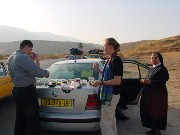 and
called the military District Coordinating Office (DCO) and was told he
had permission to pass and that things would be sorted out soon.
After getting updated, Marthame paid his driver and sent him off, deciding
it would be better to try his fate with Fr. Aktham. Should he fail,
the next option was less clear - there are no Israeli taxis around here
to take back to Jerusalem, and the car only has room for five passengers
- Fr. Aktham, Elizabeth, Andrea, and two of the Rosary Sisters. As
soon as Marthame arrived, the soldiers began to berate us again.
"Seger! Go away. Back off!" Then Marthame spotted one
of the soldiers from his last time here, one who had been somewhat helpful.
This time, however, he had other plans in mind. "Ah, you're a priest.
You can't pass. Go away." For the next three hours, we waited.
Elizabeth embroidered, the soldiers came and told up to move the car farther
from the checkpoint, the sisters chatted, we all stretched our legs, the
soldiers told us to go farther away, Fr. Aktham called the DCO again, one
sister tried to take a nap. We decided to eat, then, setting out various
salads (hummus, baba ganoush, Greek salad, parsley/tahini salad, cucumber
yogurt salad, which Elizabeth had bought just before leaving Jerusalem)
on Fr. Aktham's trunk. A nice day for a picnic, we joked. Somehow
this really upset the soldiers, who came back, threatening us that they
would close the checkpoint altogether if we didn't back up even further
(we were already several hundred meters from them). One soldier threatened
to hit Fr. Aktham, another told one of the Sisters to shut up. We've
had better treatment. Repeated calls to the DCO were met by bafflement.
"You're still there? I gave them the order to let you pass!"
The sun went down, fewer and fewer cars arrived, and options for getting
back were fewer and fewer as well. Finally, a Palestinian walked
over to us from the checkpoint: "The soldiers want you." We piled
in the car with relief and approached the checkpoint. We were met
by a soldier who fortunately spoke fluent English.
and
called the military District Coordinating Office (DCO) and was told he
had permission to pass and that things would be sorted out soon.
After getting updated, Marthame paid his driver and sent him off, deciding
it would be better to try his fate with Fr. Aktham. Should he fail,
the next option was less clear - there are no Israeli taxis around here
to take back to Jerusalem, and the car only has room for five passengers
- Fr. Aktham, Elizabeth, Andrea, and two of the Rosary Sisters. As
soon as Marthame arrived, the soldiers began to berate us again.
"Seger! Go away. Back off!" Then Marthame spotted one
of the soldiers from his last time here, one who had been somewhat helpful.
This time, however, he had other plans in mind. "Ah, you're a priest.
You can't pass. Go away." For the next three hours, we waited.
Elizabeth embroidered, the soldiers came and told up to move the car farther
from the checkpoint, the sisters chatted, we all stretched our legs, the
soldiers told us to go farther away, Fr. Aktham called the DCO again, one
sister tried to take a nap. We decided to eat, then, setting out various
salads (hummus, baba ganoush, Greek salad, parsley/tahini salad, cucumber
yogurt salad, which Elizabeth had bought just before leaving Jerusalem)
on Fr. Aktham's trunk. A nice day for a picnic, we joked. Somehow
this really upset the soldiers, who came back, threatening us that they
would close the checkpoint altogether if we didn't back up even further
(we were already several hundred meters from them). One soldier threatened
to hit Fr. Aktham, another told one of the Sisters to shut up. We've
had better treatment. Repeated calls to the DCO were met by bafflement.
"You're still there? I gave them the order to let you pass!"
The sun went down, fewer and fewer cars arrived, and options for getting
back were fewer and fewer as well. Finally, a Palestinian walked
over to us from the checkpoint: "The soldiers want you." We piled
in the car with relief and approached the checkpoint. We were met
by a soldier who fortunately spoke fluent English.
| "You called us up?"
"Yes. It's closed. Go away." "You called us up to tell us it's closed? But the DCO assured us we can pass!" "I don't have any orders." "Here. Talk to him." "I don't talk to anyone on the phone. Only by radio. You'll have to wait back there." "Why can't we wait here? You'll get the order in a few minutes." "You can't wait here. It's a checkpoint. Go back there." "OK. Now you're playing games with us." "You think I'm playing games, bro?" "At least let us wait next to that truck there." "Behind that barrier. You can wait there." |
"How long will you stay in Zababdeh? A few days?"
"Yes. Can we pass from here tomorrow or the day after?"
"This checkpoint is closed until we finish."
Those last words rang in our ears as we made the final stretch of our journey. Finish what? Where? Why? We made it home twelve hours after our morning journey began, to discover that the electricity is out. This has been happening three or four times a day for the past few weeks. We decided to go up to the University to catch up with the ex-pats there and to also borrow their electricity (they have a back-up generator) to charge our electrical devices just in case. We're all wondering what the coming days will bring.
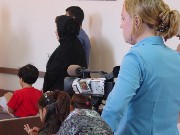 Friday,
10/10/03: After a full day of recovery and strategizing with
Andrea, she and Marthame went to Tubas in the morning to film church and
Sylvia, one of our subjects there. A college student at An-Najah
University in Nablus, she travels weekly across nearly impossible roads
into that sealed-off city. We wanted to start her section off in
her context, among the Christian minority of this village. It was
also good to share in worship with them, since this community has become
part of our community over the past three years. Elizabeth joined
us for lunch, and then Marthame headed back to Zababdeh. Elizabeth
and Andrea will stay overnight here and join Sylvia on her journey in the
morning, and will stay in Nablus for a while to film her and a couple of
others. Meanwhile, Marthame will hold down the fort back home, dealing
with the emails and planning for some groups we hope will come to visit
this month. We're on the home stretch here, something which helps
deal with the nonsense of this place - or perhaps just delays our dealing
with it all. People are talking about the suicide bomber in Haifa;
the twenty-eight year old was about to complete her certification as a
lawyer. Four months ago the IDF killed her cousin and brother in
front of the family home. Apparently the trauma of witnessing that loss
turned her toward revenge. Cruelty knows no borders here.
Friday,
10/10/03: After a full day of recovery and strategizing with
Andrea, she and Marthame went to Tubas in the morning to film church and
Sylvia, one of our subjects there. A college student at An-Najah
University in Nablus, she travels weekly across nearly impossible roads
into that sealed-off city. We wanted to start her section off in
her context, among the Christian minority of this village. It was
also good to share in worship with them, since this community has become
part of our community over the past three years. Elizabeth joined
us for lunch, and then Marthame headed back to Zababdeh. Elizabeth
and Andrea will stay overnight here and join Sylvia on her journey in the
morning, and will stay in Nablus for a while to film her and a couple of
others. Meanwhile, Marthame will hold down the fort back home, dealing
with the emails and planning for some groups we hope will come to visit
this month. We're on the home stretch here, something which helps
deal with the nonsense of this place - or perhaps just delays our dealing
with it all. People are talking about the suicide bomber in Haifa;
the twenty-eight year old was about to complete her certification as a
lawyer. Four months ago the IDF killed her cousin and brother in
front of the family home. Apparently the trauma of witnessing that loss
turned her toward revenge. Cruelty knows no borders here. Saturday, 10/11/03: Elizabeth and Andrea got up at four thirty to film Sylvia as she made her journey to Nablus. After a small breakfast, a 4-wheel drive truck - our taxi through the hills - arrived. The "road" was the roughest Elizabeth had ever been on in Palestine; often she was convinced we were about to roll over - sometimes to the side, sometimes forward. Elizabeth remembered that the last time she was in Nablus, a university student said a friend of hers died in a car accident in the hills, trying to get to school. Thank God we arrived safely. The rest of the day was spent filming and getting settled with our kind hosts at the Anglican compound near the Old City. Fr. Aktham has taken pity on Marthame - the poor bachelor - inviting him to share lunch with him and Deacon Imad. Fr. Aktham is supposed to leave after church today to travel to the States, but given the situation, he is now waiting for permission from the DCO ahead of time to cross the checkpoint. It has not come, which means he has postponed his trip. Other internationals were turned back when trying to leave the West Bank, so it seems the old days of preferable treatment for non-Palestinians are slowly slipping from our grasp here. It's possible this is a temporary measure, and we all hope so, but who can be certain at this point. Marthame spent much of the day planning for a group from the PCUSA to come on Monday. We hope they can get in. Marthame should meet up with them on Sunday, but it's not clear that he would be able to arrive in Jerusalem or that he would be allowed back in once out. Better to stay and to coordinate things by telephone.
Sunday, 10/12/03: This morning Elizabeth and Andrea went to worship at the Anglican Church in Rafidia (sister city to Nablus, like Ft. Worth is to Dallas). Much of the time in church and afterward we spent filming and eating good food with nice people. Meanwhile, Marthame went to Mass at the Latin Church, sharing in the liturgy with Fr. Aktham. In the afternoon, Marthame joined with two English teachers from the University in a trip up to Jalame to visit native son Nasser Abu Farha. Abu Farha is
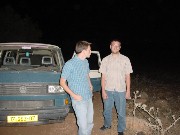 currently
working on his PhD at the University of Wisconsin on the possibility of
a long-lasting solution to the conflict here. It has sprung into
a grassroots organization.
To sit with him was a pleasure, to hear a man committed to real peace,
who isn't afraid to speak the truth - to whatever community - and to both
challenge myths and get to the root causes of the conflict. He roundly
criticizes the possibility of a two-state solution, because it doesn't
answer the deep-seated concerns of both states: for Palestinians, it is
the question of their indigenous rights. For Jews, their safety and
security. Both should be taken seriously. However, two myths
need to be dealt with: the myth of an exclusively Jewish State, on the
one hand, and the myth that Israelis should "go back to where they came
from" on the other. It is, in short, a just proposal which takes
both practicality and idealism into consideration. In short, it would
be a single confederation of alternating Arab and Jewish States - Tel Aviv
would be Jewish, Nablus Arab, and so on. He has no illusions about
the probability of its implementation, but is here to both promote it and
to do further research. On the way back, as the sun went down, a
taxi driver stopped us to warn us of a checkpoint on the road ahead.
He told us of an alternative route, which we tried to take - we got lost,
the van got stuck a couple of times, and the battery failed at one point.
We decided to turn back and take our chances at the checkpoint, which in
the end had been removed. A little dusty, we made it home to find
a moving email from one of our favorite students who lives in Jenin:
currently
working on his PhD at the University of Wisconsin on the possibility of
a long-lasting solution to the conflict here. It has sprung into
a grassroots organization.
To sit with him was a pleasure, to hear a man committed to real peace,
who isn't afraid to speak the truth - to whatever community - and to both
challenge myths and get to the root causes of the conflict. He roundly
criticizes the possibility of a two-state solution, because it doesn't
answer the deep-seated concerns of both states: for Palestinians, it is
the question of their indigenous rights. For Jews, their safety and
security. Both should be taken seriously. However, two myths
need to be dealt with: the myth of an exclusively Jewish State, on the
one hand, and the myth that Israelis should "go back to where they came
from" on the other. It is, in short, a just proposal which takes
both practicality and idealism into consideration. In short, it would
be a single confederation of alternating Arab and Jewish States - Tel Aviv
would be Jewish, Nablus Arab, and so on. He has no illusions about
the probability of its implementation, but is here to both promote it and
to do further research. On the way back, as the sun went down, a
taxi driver stopped us to warn us of a checkpoint on the road ahead.
He told us of an alternative route, which we tried to take - we got lost,
the van got stuck a couple of times, and the battery failed at one point.
We decided to turn back and take our chances at the checkpoint, which in
the end had been removed. A little dusty, we made it home to find
a moving email from one of our favorite students who lives in Jenin:
| Hi Miss Elizabeth,
I'm glad to know about your news, and very happy to get a letter from you last week, especially ,I didn't see you a long time, I hope that you and Mr. Marthame are happy because you will go to the States ,I know that is hard for you and us ,but I think the life there is better for you, there is no war ,no blood ,no killing, no check points . I'm very sad about what is happening here, especially these days after the bomb in Haifa that is killing us one by one, before that bomb there was good days, many check points opened, like that one between Zababdeh and Jenine, Hamra, and more. But this bomb was very bad for Palestine and Israel. hamas and jihad are killing us these days by there bombs. I don't know what they want, what was useful in killing 19 human? Just to close roads, to damage more than 20 houses in rafah and to kill more than 8 people? To make curfiew in Jenine, and to close schools and clinics, and to damage cities, why? Is that not terror? But who can say any thing? It's the 30th day that I'm absent this year. But now I try to go to school in curfiew, I went last Wednesday .and I will go in Monday If I will can .I know that is dangerous, but what can I do? I can't be absent more .I hope we will get little of peace soon. |
Monday, 10/13/03: This morning, Elizabeth and Andrea went to An-Najah University at 8:00 to meet Sylvia and film her in her pharmacy laboratory class. The crowded class was all women (apparently very few men study pharmacy), and our friend the only Christian. In the bright sunny lab, our friend with her curly black locks floated about in a swirling a sea of white lab coats and white hijabs. The topic for the day was pregnancy tests, and the room erupted in shy giggles when the teacher asked for urine samples. Eventually, a sample was secured, and the students set about their work. After it was determined that the donor was not pregnant, class ended. We three went to the cafeteria for a cup of coffee before going to University administration to get an interview from the PR officer. He described the many difficulties of continuing education in the face of occupation as well as how he sees students transforming injustices against them into challenges which strengthen their character and their resolve to succeed. After the interview, we descended to the University sport "field" (blacktop) and met up with a student also from Tubas who is studying to be a sport teacher. We found her dribbling a basketball, oblivious to the fact that she was the only female out there, surrounded by young men playing soccer or sitting around waiting to play or just watching. Elizabeth was happy to get a basketball in her hands again and shot around with our friends, while Andrea, a real soccer player (1999 IL/WI all-conference team), kicked the ball around and took goal shots with the guys. Beneficiaries of Title IX, we grew up knowing sports were for us, too, and enjoyed playing on teams with other girls - teams which received funding and support. Anyway, there ain't no Title IX here, and it shows. Some astonishment was apparent when Andrea repeatedly nailed goal shots (scaring the goalie a bit) and Elizabeth kept making basketball shots around the key. The reaction wasn't anything either of us hadn't felt in the States, it was just stronger. Soon a passel of other female sports students showed up, lined up and did some calisthenics. A competitive sport team is probably something none of them ever have or ever will experience, and that made us sad. We left the University to meet friends for a lunch invitation at the home of a member of the Anglican parish. Delicious eggplant and meat maqlube and good fellowship were in store for us. Our host talked about the Spring 2002 incursions: she showed us the bullet holes and broken stones of her home, how all her windows were shattered, how she was staying in one interior room, afraid to move about for fear of being shot. "The tanks were right there," she said, pointing at the street just below her balcony. Sobering to imagine how people coped with the reality of that time, and how they continue to cope with its repercussions and memories. Back on the ranch in Zababdeh, today was supposed to herald the arrival of the Presbyterian Church (USA) delegation in Zababdeh. Marthame stayed in touch with them by telephone, getting their status. They finally arrived at Jalame, the only possible checkpoint for them to pass through. No such luck today - the only things passing from Israel into the West Bank were Israeli military, Israeli settlers, and Israeli goods to be sold to Palestinians. The soldiers did allow Marthame to walk up to the checkpoint to confer with the group, quite the anti-climax after all of the time spent planning and arranging. We have another group coming next week, and two the week after that, so we'll have to see what happens. Ugh.
Tuesday, 10/14/03: In Nablus, Elizabeth and Andrea followed and filmed Jeries and Elia (school-age subjects for the film) going to school, at school, and after school. They were both flattered and embarrassed by the attention. Meanwhile, the priests of Zababdeh are taking good care of Marthame the bachelor in Elizabeth's extended absence from here. Fr. Aktham has issued an open invitation for lunch until Elizabeth returns, and Fr. Thomas and Fr. Firas have invited Marthame over on several different occasions to fill in the gaps in his stomach. While Marthame is no slouch in the kitchen, he's also more than willing to share in the good company and good food. Fr. Aktham should be in the States right now, but has not been able to get permission from the local military District Coordinating Office to leave the West Bank with his Israeli-plated car. He's hoping things'll be sorted out by next week for another attempt, but the situation looks pretty bleak here. Again, we're hoping it's all temporary, but who can predict...
Wednesday, 10/15/03: Elizabeth and Andrea accompanied and filmed Afaf, another film subject, as she went to volunteer for a few hours with the Sisters of Charity (Mother Theresa's order). Elizabeth and Marthame had visited their convent/orphanage several times before, although not recently. It was nice to see a few familiar faces among the sisters and also Fr. Dominick, a charming retired Italian priest who served in Zababdeh in the 1960s. The sisters care for around ten elderly women who have no families to take them in and physically and mentally disabled children to the age of six. We filmed our friend as she distributed candy bars to the ladies, and told a Joha story to them:
(Joha is a Palestinian folkloric character who is alternately very clever and very stupid.)
| The Sultan challenged Joha and offered him a prize if he could spend a whole night on a mountain top, alone without shelter or clothing. So Joha stayed the whole long cold naked night on the summit, with only a candle to keep him warm. In the morning he put on his clothes and went to collect his prize from the Sultan. "Did you spend the night without anything?" asked the Sultan. "Yes, nothing but the light of a small candle." The Sultan got angry and said that Joha didn't deserve the prize since he'd cheated. Some time later Joha invited the Sultan for a meal. It was getting late and the Sultan was getting hungry. "Is the food ready yet?" "Oh, soon, soon." More time passed. "Is the food ready yet?" "Oh, soon. soon." Eventually the Sultan could not bear it any longer and insisted the food must be ready. Joha took him to the kitchen. Rice and beans were in a pot, hung over a candle. "I don't know why the food isn't ready. That candle kept me so warm all night on the mountain top." The next day Joha received his prize. |
After sharing with the ladies, we filmed Afaf as she helped feed the children their lunch, a mash of rice and squash. The children here vary in abilities from seemingly comatose to capable of a couple words. Elizabeth fed a little boy, perhaps four years old, who did not seem to be aware at all of his surroundings; he didn't respond to sounds, and couldn't fully open or focus his eyes. Yet he knew to open his mouth when he felt the spoon on his lips, and he knew how to swallow. Meanwhile, a little boy in a walker/stroller rolled over to us and was reaching out and grabbing Elizabeth's pant leg, seeking interaction and attention and love. This place is always so poignantly inspiring. After lunchtime with the children, we left the convent and went to St. Luke's hospital to see our friend Martina who is a volunteer nurse there, and for a doctor to take a look in Elizabeth's ear, which has been infected for the past few days. The doctor called for a new antibiotic prescription and an anti-inflammatory shot in the bum (ouch!). Hopefully Elizabeth's ear will heal up quick now, so she'll feel better and get to hear out of it again. Then we and Martina walked to Afaf's home for a delicious lunch of msakhan (main ingredient olive oil; supplementary ingredients whole wheat flatbread, onions, spices, chicken - one of our favorite dishes). We ate so much that we didn't need much supper. A plate of knaffe (Nablus's specialty sweet, made of goat cheese special crust, and syrup) at a sweets shop with Sylvia and her friends was more than enough. Marthame's day began when he was awoken (albeit rather late - our hours change when we don't have to teach) by a phone call: "Did the soldiers leave from around your place?" Apparently, there was a "curfew" in Zababdeh from about 4:00 am to 9:30 am, "curfew" meaning "stay at home until we say so or you get shot." Literally. One young man was arrested, and dozens of men and women and children of all ages were aroused from their sleep and brought down to the street for interrogation. One of the local shops was burglarized by the soldiers during their incursion, stealing a couple hundred dollars in petty cash. There's no school today of course - it should begin at 7:30, but everyone was trapped at home at the time. Marthame was blissfully unaware of all the excitement. Then the news came in: First, the US veto of a UN Security Council resolution which would condemn Israel for building its Wall. Too one-sided, came Negroponte's criticism. Astonishing. Second, a bomb in Gaza has killed three Americans in a Consular convoy. We have received a few panicked emails and phone calls. No Palestinian group has taken responsibility, all of them being quick to deny responsibility. Our friends here assert: no way, they say, that Palestinians could have done such a thing. The disturbing truth about the incident (and others like it) is that in many ways, for the public at least, there is no real truth. Whatever you want to believe (Palestinian terrorists did it, the Israeli Mossad did it, American secret service did it, Al Qaida did it, Palestinian collaborators were paid to do it) there is someone out there agreeing with you, publicizing and publishing that view, making it undeniably true for those who want to believe it. If you say it enough times, and especially if you publish it online or in a newspaper, it becomes fact. And who can argue with facts?
Thursday, 10/16/03: Marthame went to Tubas today to help with some internet work there. Our friends at that small congregation have put together a monthly publication called "Al-Haq," which means "The Truth." The Greek Orthodox Patriarchate now considers it an official publication, and they are moving towards web-publishing and a larger audience. Today, Marthame helped them get a rough website up. Considering that internet access has been spotty at best over the past week, this was no small feat! Marthame noticed with amusement that the computer error messages always focus on possible problems within the computer or modem - never suggesting that the problem might be related to military incursions or faulty regional infrastructure due to the latter. In the evening, Marthame went up to the University to hang out and do a little music jamming. New reggae lyrics: "You gotta conjugate verb. If you don't know your past, then how will you know your future?" In Nablus, Elizabeth and Andrea spent the evening as guests at a lavish engagement party. We went with Fr. Hosam, the Anglican priest, his wife, Martina, and another family who lives in the Anglican compound. The hotel reception room, where the engagement was being held was packed by the time we arrived, several hundred people - Christian and Muslim -seated at long tables. The lights were turned down and ceremony began when Fr. George and Fr. Justinus (Orthodox priests in Nablus) entered, followed by the couple and their families, all carrying candles. The priests proceeded to chant prayers and blessed the promised union. After some dancing, the couple cut an elaborate six or seven part cake with a long ceremonial sword. More dancing ensued as cake and drinks were served to the guests. Soon a line developed for guests to congratulate the couple and their families. As most guests went home, family (and us as part of Fr. Hossam's retinue) went up to the ninth floor for the celebratory supper. Perhaps a hundred people enjoyed delicious course after course of food, and the dancing (both traditional dabke circle dances and more modern moves) never stopped. Near midnight, we took our leave, while the party was still going strong.
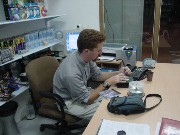 Friday,
10/17/03: This morning Andrea and Elizabeth rode with Fr. Hossam
in the parish van to pick up elementary age kids for Friday Sunday School
classes. As we went from home to home, the van got fuller and fuller
with cheerful little kids. By the time we got to the church, it was
like a clown car, watching a continual stream of kids leaving the van.
After a time together singing and praying, the kids are divided into three
age groups for their lesson, which this time was about the disciples fearing
for their lives in a storm as Jesus sleeps on the boat. The message
shared with the littlest ones was "Don't fear. God is with us." A very
appropriate lesson for children living in Nablus these days. Meanwhile,
Zababdeh's Internet woes continue. The problem seems to be with the telephone
company. Very little chance that anything'll improve today...
Friday,
10/17/03: This morning Andrea and Elizabeth rode with Fr. Hossam
in the parish van to pick up elementary age kids for Friday Sunday School
classes. As we went from home to home, the van got fuller and fuller
with cheerful little kids. By the time we got to the church, it was
like a clown car, watching a continual stream of kids leaving the van.
After a time together singing and praying, the kids are divided into three
age groups for their lesson, which this time was about the disciples fearing
for their lives in a storm as Jesus sleeps on the boat. The message
shared with the littlest ones was "Don't fear. God is with us." A very
appropriate lesson for children living in Nablus these days. Meanwhile,
Zababdeh's Internet woes continue. The problem seems to be with the telephone
company. Very little chance that anything'll improve today...Sunday, 10/19/03: In Nablus, we worshiped at the very old and beautiful Orthodox church in Rafidia. Afterwards, Martina took us on a little walking tour of Nablus's ancient Old City. Unfortunately the two soap factories (among the few still operational 3 years into the intifada) we tried to visit were closed. But we got to see the elegance of the ancient stone buildings, arches, and alleyways, as well as the astonishing scenes of destruction from the Spring 2002 incursion. The amount of firepower needed to destroy these ancient solid stone buildings must have been unbelievable. No wonder our friends living near the Old City were so traumatized. As we were heading back to the Anglican compound, Elizabeth ran into a friend, the former art teacher at the Latin school in Zababdeh. She's now teaching art at An-Najah University and able to live with her family. Last time Elizabeth saw her was this past summer, when she ran into her by chance in Ramallah. Amazing coincidence. Later in the evening, Elizabeth went to visit her at her home, marveling at her embroidery, painting, and other art on display. After a sweet visit, Elizabeth went back to get a good night's sleep in preparation for a long day of travel tomorrow. Meanwhile, Marthame worshiped at the Latin Church this morning, participating in the service with Fr. Aktham. Deacon Imad preached, his second sermon here, on the gospel passage of the least becoming the greatest. With the beatification of Mother Theresa today, it seemed a fitting passage to use. After church, Fr. Aktham left for Jordan - his trip to the States has been delayed by a couple of weeks, but he was able to pass through the checkpoint with no problem whatsoever. He will leave Jordan in a few days for a well-deserved break from this place.
Monday, 10/20/03: This morning, Elizabeth and Andrea said sad farewells to the lovely people at the Anglican compound. We enjoyed a wonderful time with them, and will miss them greatly. After six hours (three hours waiting to leave Nablus, and three hours on the "road"), Elizabeth and Andrea finally arrived back in Zababdeh. Marthame had made lunch, and to help pay back a bit of the debt of gratitude for last week, invited Deacon Imad and the new French teacher over for lunch.
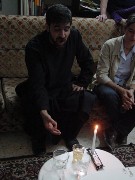
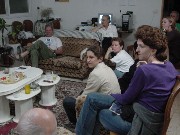 Tuesday,
10/21/03: Today a group of eleven Presbyterian Peace Fellowship folks
managed to cross the checkpoints and get to Zababdeh. When they arrived,
it was pretty close to lunch time so we all went up to the University coffee
shop. Then Marthame led them around Zababdeh, giving them the
tour of our little town and its churches. Then they split off to
meet local families who would be hosting them for a couple nights.
The group re-convened at our place in the evening for a simple lentil soup
supper and a viewing for the first section of our film. Somehow Fr.
Firas let it slip that it was his birthday, so a candy bar and a candle
masqueraded as a proper birthday cake. It's good to have visitors.
Tuesday,
10/21/03: Today a group of eleven Presbyterian Peace Fellowship folks
managed to cross the checkpoints and get to Zababdeh. When they arrived,
it was pretty close to lunch time so we all went up to the University coffee
shop. Then Marthame led them around Zababdeh, giving them the
tour of our little town and its churches. Then they split off to
meet local families who would be hosting them for a couple nights.
The group re-convened at our place in the evening for a simple lentil soup
supper and a viewing for the first section of our film. Somehow Fr.
Firas let it slip that it was his birthday, so a candy bar and a candle
masqueraded as a proper birthday cake. It's good to have visitors.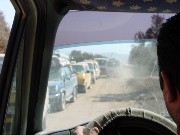 Wednesday,
10/22/03: This morning Marthame took the group to Jenin Camp through
the "roads" that cut through the olive groves. From hour to hour,
one never knows which way will be open - if any - so we were glad to find
one. A taste of daily Palestinian life.
Wednesday,
10/22/03: This morning Marthame took the group to Jenin Camp through
the "roads" that cut through the olive groves. From hour to hour,
one never knows which way will be open - if any - so we were glad to find
one. A taste of daily Palestinian life. 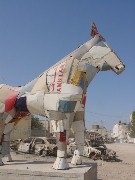
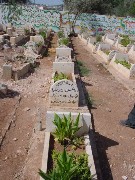 Our
guides around the Camp were three young men who volunteer with an organization
called Roots Youth Center. Among their many projects are an at-cost
kindergarten. It is refreshing to see a real grassroots organization
coming from within the community and trying to get at the roots of local
problems. In the Camp, we were met at its entrance by a sculpture
of a horse that a German artist and Camp youth made out of destroyed cars
from the Jenin Camp rubble, including very clearly parts of an ambulance.
Our guides took us to the top of the hill which overlooks the center of
destruction. "Imagine you are standing on the Mount of Olives overlooking
the Old City of Jerusalem. That's how crowded this was before it
was all destroyed." Some construction has begun, but most of the
people left homeless during the April 2002 incursion are still living and
renting outside of the Camp. We also stopped at the "Martyrs' Cemetery"
where we were met by an old man tending the flowers on the graves.
The grave stones are
Our
guides around the Camp were three young men who volunteer with an organization
called Roots Youth Center. Among their many projects are an at-cost
kindergarten. It is refreshing to see a real grassroots organization
coming from within the community and trying to get at the roots of local
problems. In the Camp, we were met at its entrance by a sculpture
of a horse that a German artist and Camp youth made out of destroyed cars
from the Jenin Camp rubble, including very clearly parts of an ambulance.
Our guides took us to the top of the hill which overlooks the center of
destruction. "Imagine you are standing on the Mount of Olives overlooking
the Old City of Jerusalem. That's how crowded this was before it
was all destroyed." Some construction has begun, but most of the
people left homeless during the April 2002 incursion are still living and
renting outside of the Camp. We also stopped at the "Martyrs' Cemetery"
where we were met by an old man tending the flowers on the graves.
The grave stones are 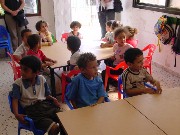 laid
end to end, because very few intact bodies were found. Thus, a stray
hand and a random foot and the odd skull were thrown into a mass grave
together. We asked the old man for his story. "The Israelis
invaded on April 4th. Who lived, lived, and who died, died.
What else can I say after I've lost my son and nephew?" What happened?
we inquired. "We were hungry, not allowed outside, so they went out
to get food. The Israelis shot them on sight." So what's the
solution? "The solution is with God. He can reconcile us.
We need to live in peace. I've lost my son, and a Jewish man loses
his son. What has been gained? The solution is with God and
God alone." We moved on from there, fed by simple, profound, graveside
philosophy. Once back in Zababdeh, we visited the Arab American University
which has been an important part of life in Zababdeh over the last three
years, meeting with some of the ex-pats there before a full supper at the
Latin convent, prepared by the Rosary Sisters. Once the visitors
were safely packed off to their hosts' homes, we headed up to the University
to let off a little steam in a music jam. This session's gem: "Turn
on the TV; you won't believe the things you'll see."
laid
end to end, because very few intact bodies were found. Thus, a stray
hand and a random foot and the odd skull were thrown into a mass grave
together. We asked the old man for his story. "The Israelis
invaded on April 4th. Who lived, lived, and who died, died.
What else can I say after I've lost my son and nephew?" What happened?
we inquired. "We were hungry, not allowed outside, so they went out
to get food. The Israelis shot them on sight." So what's the
solution? "The solution is with God. He can reconcile us.
We need to live in peace. I've lost my son, and a Jewish man loses
his son. What has been gained? The solution is with God and
God alone." We moved on from there, fed by simple, profound, graveside
philosophy. Once back in Zababdeh, we visited the Arab American University
which has been an important part of life in Zababdeh over the last three
years, meeting with some of the ex-pats there before a full supper at the
Latin convent, prepared by the Rosary Sisters. Once the visitors
were safely packed off to their hosts' homes, we headed up to the University
to let off a little steam in a music jam. This session's gem: "Turn
on the TV; you won't believe the things you'll see." 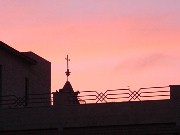 Thursday,
10/23/03: Everyone left us today: the Presbyterian group and
our friend Andrea. And we were left with mountains of work to attack.
The Jenin school bus tried to leave in the morning, but was held up at
the checkpoint for four and a half hours. No intervention - whether
through the military coordinating office, the Latin Patriarchate, the Italian
nuns in Jenin - could get the bus through. The kids have missed tons
of school this year, more than kids should be expected to bear. At
11:30, they turned around and headed home - too late to catch the taxis
through the olive groves and on to school. Surprisingly, the incident
was enough to be reported in the Palestinian Arabic-language "Al-Quds"
daily newspaper.
Thursday,
10/23/03: Everyone left us today: the Presbyterian group and
our friend Andrea. And we were left with mountains of work to attack.
The Jenin school bus tried to leave in the morning, but was held up at
the checkpoint for four and a half hours. No intervention - whether
through the military coordinating office, the Latin Patriarchate, the Italian
nuns in Jenin - could get the bus through. The kids have missed tons
of school this year, more than kids should be expected to bear. At
11:30, they turned around and headed home - too late to catch the taxis
through the olive groves and on to school. Surprisingly, the incident
was enough to be reported in the Palestinian Arabic-language "Al-Quds"
daily newspaper.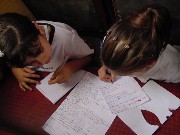 Saturday,
10/25/03: Today we went to the school to film Sawsan, another
one of our film subjects. She works at the school and lives in Jenin,
so takes the school bus every day back and forth (at least when it can
get back and forth). After school we piled onto the aging bus with the
rest of the kids, who were tickled to have us with them. It was nice
to be with the students again (especially when we don't have to maintain
classroom discipline). After twenty minutes, we arrived at the checkpoint.
And we were told to wait. Beside us were two UN vehicles and an ambulance,
and on the other side another ambulance - all of them also told to wait.
Marthame and the driver went to talk with a soldier standing on the tank.
He said, "OK. Bring the bus forward." We boarded the bus, just
as a jeep came to supplement the tank. We crept forward. "Hey
you!" barked a loudspeaker from the jeep. "I'm talking to you!
Back up!" Marthame moved to step off the bus, at which point the
tank's gun barrel pivoted towards the bus. Marthame got back on.
The children took out their homework and started doing it on the bus seats.
Many complained of needing to go to the bathroom or needing to eat or drink
- some of them as young as five years old. After about an hour and
a half, the jeep left, and there was some movement. The ambulances
and
Saturday,
10/25/03: Today we went to the school to film Sawsan, another
one of our film subjects. She works at the school and lives in Jenin,
so takes the school bus every day back and forth (at least when it can
get back and forth). After school we piled onto the aging bus with the
rest of the kids, who were tickled to have us with them. It was nice
to be with the students again (especially when we don't have to maintain
classroom discipline). After twenty minutes, we arrived at the checkpoint.
And we were told to wait. Beside us were two UN vehicles and an ambulance,
and on the other side another ambulance - all of them also told to wait.
Marthame and the driver went to talk with a soldier standing on the tank.
He said, "OK. Bring the bus forward." We boarded the bus, just
as a jeep came to supplement the tank. We crept forward. "Hey
you!" barked a loudspeaker from the jeep. "I'm talking to you!
Back up!" Marthame moved to step off the bus, at which point the
tank's gun barrel pivoted towards the bus. Marthame got back on.
The children took out their homework and started doing it on the bus seats.
Many complained of needing to go to the bathroom or needing to eat or drink
- some of them as young as five years old. After about an hour and
a half, the jeep left, and there was some movement. The ambulances
and 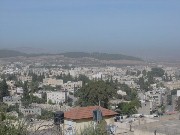 UN
cars were let through. Marthame went down again to speak with one of the
soldiers, explaining that this was a school bus with children going home
to Jenin. "OK. Yella, go." Finally, we thought.
We started up the bus and crept forward, at which point we were shouted
back. "Where do you think you're going? You can't pass."
Marthame went down again.
UN
cars were let through. Marthame went down again to speak with one of the
soldiers, explaining that this was a school bus with children going home
to Jenin. "OK. Yella, go." Finally, we thought.
We started up the bus and crept forward, at which point we were shouted
back. "Where do you think you're going? You can't pass."
Marthame went down again.
"These children want to go home."
"OK, so they can go home to Zababdeh."
"They don't live in Zababdeh. They live in Jenin."
One of the teachers showed her ID just to prove the point. Finally, after two and a half long hours (without access to a bathroom or water or food), the bus was allowed to pass. We arrived too late for a real lunch with our hosts, so we had lupper. Or is it sunch? linner? dunch? Lunch became lunch and supper, and we all felt exhausted, going to sleep early.
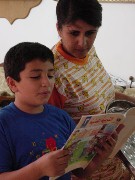 Sunday,
10/26/03: This morning Elizabeth helped Sawsan around the house
a bit, her two sons studied, and Marthame went off with Sawsan's husband
for some errands around Jenin. Others were trying to work on Israeli
permission for the bus. One of the Italian nuns went to the Salem
DCO, a bureaucratic nightmare. And for nothing. No permission,
no way. Maybe, they were told, if you change the bus. At four,
we went to the Roman Catholic church in the center of town for Sunday Mass.
There were perhaps forty people there, including a French nurse and an
Italian physiotherapist who are working through NGOs in Jenin hospitals.
The Italian, who had just done two stints in Afghanistan, said she was
exhausted by this place. The stress and daily difficulties in Jenin
far outweigh what she saw in Afghanistan - sobering thought. The French
woman had recently been in Iraq and said the Jenin hospital is better off
than the one she was at in Baghdad, but was not as well organized as the
one she served in Mosul.
Sunday,
10/26/03: This morning Elizabeth helped Sawsan around the house
a bit, her two sons studied, and Marthame went off with Sawsan's husband
for some errands around Jenin. Others were trying to work on Israeli
permission for the bus. One of the Italian nuns went to the Salem
DCO, a bureaucratic nightmare. And for nothing. No permission,
no way. Maybe, they were told, if you change the bus. At four,
we went to the Roman Catholic church in the center of town for Sunday Mass.
There were perhaps forty people there, including a French nurse and an
Italian physiotherapist who are working through NGOs in Jenin hospitals.
The Italian, who had just done two stints in Afghanistan, said she was
exhausted by this place. The stress and daily difficulties in Jenin
far outweigh what she saw in Afghanistan - sobering thought. The French
woman had recently been in Iraq and said the Jenin hospital is better off
than the one she was at in Baghdad, but was not as well organized as the
one she served in Mosul.Monday, 10/27/03: This morning we rode the school bus, which passed the checkpoint with minimal wait. The soldier focused on Marthame's presence.
"What are you doing here?"
"Here's my visa. I'm working at the school."
"OK. You can pass here for work, but not for anything else. Not in your car."
"I don't have a car."
"Even so, you can't pass unless it's for work."
"I don't go anywhere unless it's for work these days."
The rest of our day was spent working at home, where we were glad to arrive safe and sound. This afternoon a group from Chicago was due to come visit us, but they were refused entry at Hamra checkpoint. "This is not a place for tourists. If you know others on their way, tell them not to come," was the message from the soldiers. For those of you keeping stats at home, our record with visitors is now 1-2 this month.
Thursday, 10/30/03: Today a British group was scheduled to visit. We advised them that the Jalame checkpoint was their best bet, having a marginally better track record (of letting foreigners pass) than Hamra. Astoundingly, they were allowed in (but not their tour guide or their bus driver, both of whom are Palestinians with Jerusalem IDs, and so are technically not allowed to travel in the Occupied Territories - except of course East Jerusalem where they live). A contact of theirs met them and took them on a tour of Jenin and Jenin camp and then got them to Zababdeh late in the afternoon. We gave an abbreviated tour, had them meet the priests and hear from them, and then sent them off to host families for the night. Two stayed with us, and we enjoyed Marthame's specialty shakshouka (tomato onion and egg dish) and good conversation until we all pretty much nodded off.
Friday, 10/31/03: Happy Halloween! Since that holiday is not celebrated here, we almost forgot about it. The Brits left early this morning. A very short visit, but we hope the group enjoyed their time here. Half of them left at 6 AM with a Samaritan driver to go to Nablus. At the Tayasir checkpoint, they were told that, under no circumstances, would they be allowed to pass. So they went to the Hamra checkpoint, where they passed with minimal hassle. The other half left around 8:30 heading to Jayyous to see the impact the Wall has had on that community, cut off from their land, from their former day labor jobs in Israel, and from the West Bank. We have to hand it to this group - without a guide, and with no one speaking Arabic in their group, they managed to manage getting around. We joked about beginning with Plan A and ending beyond Plan Z within a matter of hours. It's not so funny these days.
